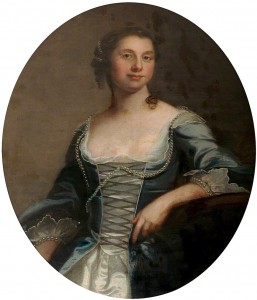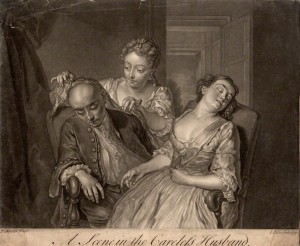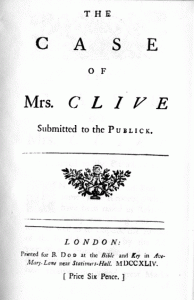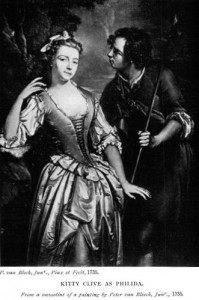- Portrait of a Lady, Traditionally identified as Kitty Clive, by Thomas Hudson
- Kitty Clive (Kitty Clive) as Lady Easy in The Careless Husband. by John Faber Jr, after Philip Mercier, mezzotinto, 1739, NPG D1431
- 1735 painting of Clive in her role as Philida
Catherine “Kitty” Clive (1711- 85) Born Catherine Raftor in London in 1711.[1] Her father, William Raftor, likely came from a wealthy Irish family that lost its fortune due to its support of King James II before the Glorious Revolution of 1688.[2] Although her father received a commission for serving in the French army under Louis XIV, Clive’s family suffered financially and she had to work as a servant in the homes of the wealthy.
Many of the illustrious stage actresses of her time had dramatic stories of discovery, and Clive was no exception. Whether or not these stories were actually true, or were created to add to an actress’s allure, is impossible to know. According to her biographers, when Clive was about seventeen she was singing while washing the front steps of her employer’s home, near a tavern frequented by several stage performers. The tavern’s patrons overheard Clive’s voice and recommended her to the manager of the Theatre Royal, Drury Lane, Colley Cibber, who hired her at twenty shillings per week.[3]
Her first role was as the pageboy, Ismenes, in Nathaniel Lee’s Mithridates, King of Pontius (1678). Clive went on to play multiple roles later that season and became a huge success.[4] Clive competed for fame and the best roles with other theater greats such as Lavinia Fenton and Susannah Cibber.[5] Despite an infamous temper, Clive became Drury Lane’s leading comedic actress, the most lucrative position for theaters at the time.[6] Besides singing, she was greatly admired for her ability to impersonate characters from the social elite, a difficult feat for an actress from London’s lower classes.[7] Clive became one of the highest-paid actresses of her time. There may have been at least one season when she earned more than the most popular male actors, who were paid significantly higher wages than their female counterparts.[8]
Around 1732 Kitty Clive is said to have married George Clive and then separated from him not long after, though no records exist to prove their union.[9] The couple remained on friendly terms and never divorced but they also never lived together again and Clive remained economically independent.[10] Because Clive never openly took lovers, she technically kept her marriage vows, which allowed her to avoid scandal and preserve her reputation.[11] Actresses often had to contend with rumors of moral laxity that could destroy their reputation. In fact, it was common at that time for women in the theater to be thought of as prostitutes.[12] Clive’s ability to manage her private life and reputation to meet society’s standards enabled her to have a long and successful career.[13] Her public persona as a respectable woman also strengthened the social standing of female stage performers in general.[14]
Kitty Clive’s positive reputation benefited her when she became involved in women’s and actors’ rights later in her life. Despite having received very little education, Clive was acknowledged as exceedingly bright. She wrote several dramatic sketches with feminist undertones including The Rehearsal, or Boys in Petticoats (1750); Every Woman in her Humour (1760); and Sketches of a Fine Lady’s Return from a Rout (1763).[15] Clive cleverly used satire to criticize the obstacles female performers and playwrights faced in order to gain sympathy for their plight.[16]
Because of her status as one of the company’s highest earners, Clive had the power and courage to fight financial injustices within the performing arts. She publicly humiliated theater managers Christopher Rich and Charles Fleetwood for conspiring to drive down actors’ salaries and cheat performers out of their due.[17] She and her fellow actors printed pamphlets debating the rights of actors against those of management. In one publication, The Case of Mrs. Clive (1744), she argues that the relationship between performer and manager shouldn’t resemble that of a slave to its master. Clive fought against insinuations that actors were nothing more than beggars, thieves, or whores, and she stood against oppression and injustice in the theater.[18]
Kitty Clive retired from the stage in 1769 after a wildly successful career.[19] She died on December 6, 1785 and was buried in St. Mary’s, Twickenham churchyard in London.[20]
[1] Berta Joncus, “Catherine Clive,” Mary Hays, Female Biography; or, Memoirs of Illustrious and Celebrated Women, of All Ages and Countries (1803). Chawton House Library Series: Women’s Memoirs, ed. Gina Luria Walker, Memoirs of Women Writers Part II (Pickering & Chatto: London, 2013), vol. 7, 401-4, editorial notes, 473-74, on 399.
[2] Lewis Melville, Stage Favourites of the Eighteenth Century (Garden City, N.Y.: Doubleday Doran & Company, Inc., 1929), 53; and Mary Hays, “Catherine Clive,” Female Biography; or, Memoirs of Illustrious and Celebrated Women, of all Ages and Countries (6 volumes) (London: R. Phillips, 1803), vol. 3, 399-402, on 399-400.
[3] Melville, Stage Favourites, 54-6.
[4] Melville, Stage Favourites, 55-56; and Hays, “Catherine Clive,” vol. 3, 399-402, on 400.
[5] Melville, Stage Favourites, 62.
[6] Tanya Caldwell, Popular Plays by Women in the Restoration and Eighteenth Century (Peterborough, Canada: Broadview Press, 2011), 28; and Melville, Stage Favourites, 62.
[7] Felicity Nussbaum, Rival Queens: Actresses, Performance, and the Eighteenth-Century British Theater (Philadelphia: University of Pennsylvania Press, 2010), 156.
[8] Felicity Nussbaum, Rival Queens, 51.
[9] Melville, Stage Favourites, 59; and Joncus, “Catherine Clive,” vol. 7, 401-4, editorial notes, 473-74, on 474.
[10] Nussbaum, Rival Queens, 153.
[11] Caldwell, Popular Plays, 28.
[12] Laura Engel and Elaine M. McGirr, eds. Stage Mothers: Women, Work, and the Theater, 1660-1830 (Lenham, Maryland: Bucknell University Press, 2014), 43-7.
[13] Nussbaum, Rival Queens, 153.
[14] Fiona Ritchie, Women and Shakespeare in the Eighteenth Century (New York: Cambridge University Press, 2014), 43.
[15] Melville, Stage Favourites, 55; and Nussbaum, Rival Queens, 178.
[16] Caldwell, Popular Plays, 16.
[17] Ritchie, Women and Shakespeare, 51.
[18] Nussbaum, Rival Queens, 163-4.
[19] Melville, Stage Favourites, 71.
[20] Ritchie, Women and Shakespeare, 53.
Bibliography:
Caldwell, Tanya, ed. Popular Plays by Women in the Restoration and Eighteenth Century. Peterborough, Ontario, Canada: Broadview Press, 2011.
Clive, Catherine. The Case of Mrs. Clive Submitted to the Public. London: B. DOD at the Bible and Key, 1744. Accessed Feb 28, 2015. http://digital.library.upenn.edu/women/clive/case/case.html
Engel, Laura and Elaine M. McGirr, eds. Stage Mothers: Women, Work, and the Theater, 1660-1830. Lenham, Maryland: Bucknell University Press, 2014.
Joncus, Berta. “Catherine Clive.” Mary Hays, Female Biography; or, Memoirs of Illustrious and Celebrated Women, of All Ages and Countries (1803). Chawton House Library Series: Women’s Memoirs, ed. Gina Luria Walker, Memoirs of Women Writers Part II. Pickering & Chatto: London, 2013, vol. 7, 401-4, editorial notes, 473-74.
Hays, Mary. “Catherine Clive.” Female Biography; or, Memoirs of Illustrious and Celebrated Women, of all Ages and Countries (6 volumes). London: R. Phillips, 1803, vol. 3, 399-402.
Melville, Lewis. Stage Favourites of the Eighteenth Century. Garden City, N.Y.: Doubleday Doran & Company, Inc., 1929.
Moore, Frank Frankfort. The impudent comedian: & others. Chicago: Herbert S. Stone & Co., 1896.
Nussbaum, Felicity. Rival Queens: Actresses, Performance, and the Eighteenth-Century British Theater. Philadelphia: University of Pennsylvania Press, 2010.
Perry, Gill. The First Actresses: Nell Gwyn to Sarah Siddons. Ann Arbor: University of Michigan Press, 2011.
Ritchie, Fiona. Women and Shakespeare in the Eighteenth Century. New York: Cambridge University Press, 2014.
Page citation:
Lindsay Smith. “Catherine (Kitty) Clive.” Project Continua (April 6, 2015): Ver. 1, (date accessed), http://www.projectcontinua.org/catherine-kitty-clive/
Tags: Actors, Enlightenment, Essayists, Europe, Playwrights




